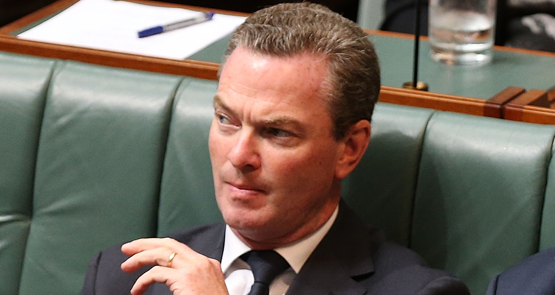Has ever a set of reforms been more badly handled by a minister than Christopher Pyne’s higher education reforms? Probably, but it’s hard to recall an example at the moment. Maybe the Gillard government’s belated media reform proposals? But they didn’t come with a substantial budgetary impact, and Stephen Conroy had actually undertaken a review first. Maybe Peter Dutton’s botching of the co-payment issue? Though that’s now been settled by a change of minister. Maybe the mining tax — but that had a strong and well-researched policy rationale.
So Pyne is certainly a contender, one who has given a masterclass in how not to reform. Produce a major and controversial reform out of the blue without any effort to explain to the public what problem it’s intended to fix? Check. Poor selling once it’s been announced? Check. Failure to do the basics like modelling to demonstrate the benefit of the reforms? Check. Inability to convince the crossbench? Check. Indeed, Pyne went further and actually so annoyed crossbenchers they refused to speak to him. Belated cave-in on the reform? Check. Failure of belated cave-in to convince crossbench? Check. Indeed, Pyne did that not once but twice with a second cave-in that entirely neutered the last remaining savings from his package.
Even as he’s smashed these KPIs of poor reform process, Pyne has remained relentlessly upbeat about his chances of success, a kind of gleefully happy Fuhrer in the bunker repositioning fictitious divisions and launching offensives with armies that don’t exist, a Comical Ali waving off talk of defeat as the Senate tanks rolled in behind him. Now there’s talk, hilariously, of a double dissolution election on the issue. Good luck there, what with even 30% of Liberal voters disliking the reforms. Having had the Senate remove this particular barnacle instead of the government, Pyne appears keen to affix it once again to the government’s hull. Still, that’s the best part about Pyne, he’s utterly indefatigable even in declaring not merely is black actually white, but that any claims it is black are a Labor scare campaign.
The only upside is that Pyne has only lost $1.9 billion in savings — it was $3.9 billion in the budget — instead of, if the bill had passed yesterday, wearing $1.4 billion in additional spending intended to soften the blow of deregulation. The savings will stay in the budget papers, presumably — the real reason for Pyne’s talk of keeping this retreat from Moscow going well beyond Paris and into the Atlantic.
Indeed, much of the forthcoming budget will be composed purely of paper savings that exist only in the hopes of ministers, especially with backbenchers keen to knock off one of the government’s genuine high-quality reforms, reducing the rate of indexation of pensions. That won’t be anywhere near enough to reach Tony Abbott’s goal of balancing the budget within five years, which he restated this morning after telling the joint party room yesterday. This is the third different fiscal approach adopted by the Coalition in 25 months — first it was a return to surplus in its first year in government and then every year after that, in 2013; then it was an undated commitment to return to surplus over the medium term, adopted as they neared the election; now it’s a surplus by 2019-20.
In reality, the government’s primary fiscal challenge in the budget is to prevent the deficit blowing out for a third time, after it blew out in the 2013 and 2014 Mid-year Economic and Fiscal Outlooks, and extending deficits into 2018-19.
With the iron ore price falling yet further, Treasurer Joe Hockey wisely unwilling to endanger already tepid growth with further budget cuts and almost-daily backflips costing tens hundreds of millions of dollars, Abbott’s five-year plan looks ambitious at best, although the budget will be silent on the issue given 2019-20 won’t be included in the budget papers. And the more important point is this: according to the government’s own figures, it is planning — even without the paper savings it will pad the budget with — to pump $100 billion into the economy by deficit spending over the next four years, the bulk of it this year and next, and yet no one believes we’ll be returning to trend growth any time soon.
A lot of that can be put down to the massive hit inflicted on business and consumer sentiment by the 2014-15 budget. Bad reform processes, like the one for which Pyne is now an exemplar, are more than just failures for the government. They can affect the real world outside Canberra.










Reith, Abbott, now “The Stirk of Sturt”? What is it about Liberal “Bleeders of the House”?
The Government is paying dearly for hiding its radical ‘reform’ agenda from the voters before the 2013 election, apparently deciding that they could slip it in under cover of a concocted ‘budget emergency’.
Yes, but you forgot: spend the odd 10 million or so, on a confusing and pointless information campaign, that advertised a policy that was never likely to get through the Senate. Check!
Could someone explain.to me please why Abbott and co keep saying that the budget would have been so much worse under Labor? Today Abbott said the debt and deficit disaster line which haven’t heard for a while. Seeing as this govt has done away with a whole heap of Labor’s income like the carbon tax, mining tax, super changes and the car financing rort changes I can’t work out why no one is picking up and challenging these silly lines.
What concerns me is; do these people believe their own bullshit? It is one thing to try and pull the wool over the electorates eyes, that is annoying enough. But I get the feeling that they actually don’t have another plan, I don’t detect a secret plan that may be unpalatable but will deliver the country a better outcome, I truly believe they have no idea what to do next.